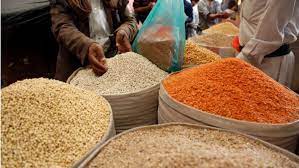The prognosis is already bleak. Tough time awaits us all if nothing is done. But the onus lies on the federal government, together with other critical stakeholders in Nigeria’s rice industry. They need to do something. And it should be fast.
The media reported recently that rice mills in Kano state are closing shop over low patronage, owing to the scarcity of rice paddy for cultivation. Alhaji Dalhatu Abubakar, chairman, Northern Chamber of Commerce Industry, Mines and Agriculture, who made the disclosure, said paddy scarcity would force an increase in the price of rice.
He said with that, rice smuggling will escalate, and expressed fear that food insecurity may hit its worst level in Nigeria, if the present scarcity of paddy, a major raw material for the production of rice, persists. Abubakar said several rice millers in Kano have cut down production from 24 to 12 hours, while laying off workers.
He solicited the federal government’s intervention in the area of mechanisation. “The federal government also needs to assist our rice farmers with the needed inputs for all-year round production of the staple food crop.
“Hundreds of millers, integrated and small scale, are in a dilemma and finding it extremely difficult to break even. It is difficult to sustain production now, because of the scarcity of paddy. As I speak, I know many millers that have closed their factories”.
Abubakar lamented that, “Wherever you see paddy now, you will buy it at an exorbitant price, and you will still be compelled to face the high cost of fuel, pay tax, and electricity bill. How many factories would survive these hard times?”
This scarcity of paddy rice alarm has again brought to the fore the multifarious challenges hindering the growth of the rice industry. In recent years, Nigerian rice farmers, millers and processors have lamented to high heavens, how the smuggling of foreign rice varieties is killing their businesses.
Dr. Andy Ekwelem, Director General of the Rice Processors Association of Nigeria, RIPAN, at a recent media parley, declared that rice smuggling across the land borders is the bane of the rice sub-sector in the country.
It is unfortunate that the scarcity of paddy has already led to the retrenchment of workers by some Kano rice millers. The development, of course, will aggravate the unemployment crisis in the state. Those sacked have been thrown into emotional turmoil.
The development is also an unsavoury one for the Kano millers, battling to stay afloat in the market. They will surely have to contend with increased cost of production. It is a grim situation that may even decide the fate of their business, if intervention does not come their way in earnest.
Nigerians would also not be left out the consequences of paddy shortage. In the months ahead, possibly after our local farmers must have harvested their produce, citizens would have to contend with buying local rice varieties at exorbitant prices. But the price increment may serve as a blessing in disguise for foreign rice, whose demand may soar.
In fact, reinvigorating Nigeria’s rice sector, while tackling the problem of paddy scarcity, demands collective efforts of by stakeholders. Already, one of the stakeholders, the Nigeria Customs Service, NCS, is assiduously giving illegal rice importers a bloody nose.
However, key stakeholders in the country’s rice industry must think out-of-the-box to ensure the availability of enough rice paddies across Nigerian markets, for the benefits of farmers who may still be interested in cultivating the staple commodity, before the raining season ends. As for our farmers, they should resolve to forthwith, adopt the best global practices of boosting rice cultivation.
The government, on its part, must renew its commitment to salvaging the fortunes of Nigerian farmers, in general. In particular, there are things that the government, again must do to boost local rice cultivation. The need for the government to adequately fund research in viable rice seeds’ production cannot be overemphasised.
Also, a funding programme to enable members of RIPAN and other rice processors in the country to engage in paddy production, through large-scale farming, the out-grower scheme, and contract farming, among others, is needed. The reality is that most of our local farmers lack sufficient capital for massive food cultivation. That is why government must make the Anchor Borrowers and other credit facilities more accessible to a larger section of peasant farmers.
There are ways state governments can also assist in boosting the local production of rice. But the most important one is for them to ease the bottleneck in the processes of acquiring land for massive farming of rice. The federal government rehabilitate and expand its moribund irrigation facilities across the country to enable multiple cycles of rice cultivation by commercial farmers.
Government should develop a mechanised service programme on the provision of tractors and planters, threshers and dryers, together with strategic farm silos/warehouses (to curb post-harvest losses) to small-holder rural farmers, who form the bulk of rice and other crops’ producers in the country.
Holistically, both the federal and state governments have a lot to do in making agriculture regain its lost glory, guarantee food security for citizens and also become a viable alternative source of revenue generation for the nation; enough of paying lip service to Nigeria’s food sector.
By the time they summon the political will to do the needful, then not only the current scarcity of paddy in Kano that is affecting rice millers in the state, but several other challenges hindering agricultural growth in the country will become history.
Obamodi Oluwadamilola Faith,
Veritas University, Abuja




